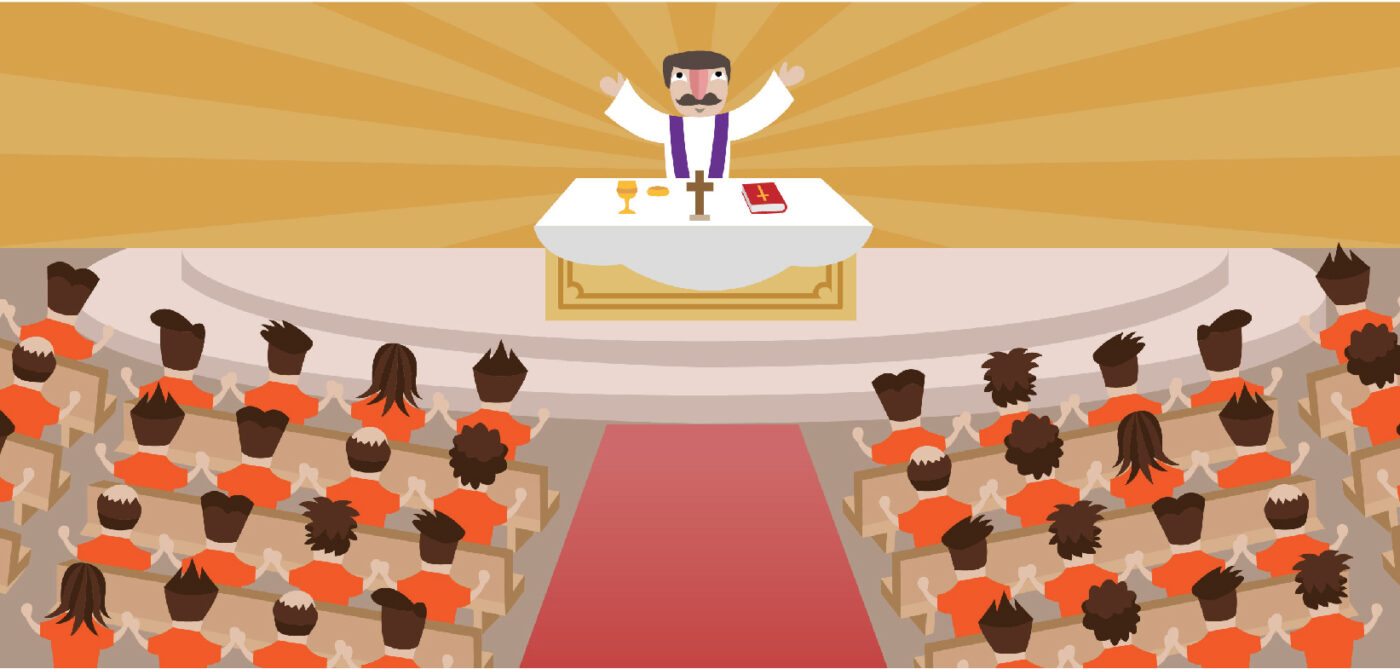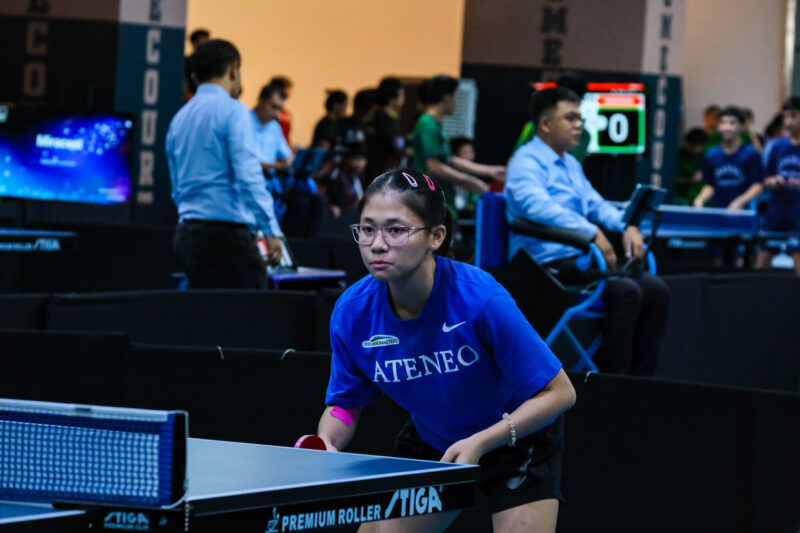Mark Reyes* has lived in New Bilibid Prison’s (NBP) Maximum Security for twenty years. He rises at 7:00 AM, speaks about the Gospel at 8:00 AM and proceeds to the Board of Discipline by 9:00 AM. Here, he assists the Bureau of Corrections (BuCor) in handling cases of inmates caught in the possession of cell phones, drugs and deadly weapons. He is a jolly, pious man, who holds a position of office at the facility’s parish.
“Wala ka nang tatakbuhan kundi bagong buhay dito sa loob (You have nothing else to turn to but a new life here),” he says, his head kept low not in shame, but in humility.
One would not have guessed Reyes is convicted of murder. It was in 2001, after a death sentence, an attempted escape from prison and the abolishment of the death penalty, when Reyes came into acquaintance with the Philippine Jesuit Prison Service (PJPS). He was putting his daughter through school, and PJPS granted her a scholarship.
PJPS came out of Fr. Vic Labao, SJ’s apostolate work at the NBP, an effort the Philippine Province of the Society of Jesus recognized in 1993. The group returned as a registered non-government organization a year later—the same year Reyes would first arrive at the prison.
His daughter is now on her way to earning a college degree. “Malaki talaga ang tulong ng PJPS sa akin (PJPS has really been a huge help to me),” Reyes says.
Prison programs
Since its inception in 1995, the PJPS scholarship program has helped a total of 101 students earn college degrees. This year, 105 children are part of the program, with 37 of them in grade school, 36 in high school and 32 in college.
“One of our goals is to prevent and minimize the cycle of poverty and criminality,” says Fr. Eli Lumbo, SJ, PJPS executive director. “So when the children graduate and have good jobs, the family is very happy.”
“Education breaks the cycle,” adds Purisima Miranda, PJPS Programs and Scholarships coordinator.
To Labao, the decision to provide scholarships came on a whim; he noticed children in the camp during weekday mass and had subsequently ended the ceremony with: “Tomorrow, we’ll be accepting applications for the scholarship program of PJPS.” When asked where they would get the money, Labao replied, “God will provide.”
For the five-man staff running PJPS, work runs regularly at the NBP, the country’s most notorious jail,which houses 22,000 inmates. Men who are in for life get sent to the maximum facility, which houses 14,000 and resembles a barangay.
There are sari-sari stores and carinderias, a tennis court, a bakeshop, a park, and a hospital. Like their children, inmates also go to school here. The facility has an elementary school, high school, college and even a vocational school. “It’s a microcosm of the world outside,” Lumbo explains.
At the time of the visit, there was only one doctor at the hospital, which can accommodate approximately 300 inmates. It is a whitewashed structure, with yero for the roof. The inmates have a song for this place, which Reyes readily samples: “You lie there / and you die there.”
Here, PJPS’ socio-medical program is targeted toward inmates confined in the intensive care unit, surgery and psychiatric wards. The program also provides inmates with legal aid.
They also provide sacramental services to the inmates, and their advocacy program teams up with the Ateneo’s Office for Social Concern and Involvement, as well as Jesuit schools abroad, in order to send students on immersions to the NBP. “Different organizations, schools and parishes [come in], and they stay for a week, sometimes [a] month. They stay with us just to immerse themselves and see for themselves the real situation,” says Miranda.
PJPS’ most important program, however, is formation, which Lumbo says “keeps everything together.”
“There is really a need for formation when it comes to the scholars,” he says in a mix of English and Filipino. “We realized it’s not just a matter of sending these children to school, given their special context. They’re children of inmates,” Lumbo explains. “They have to deal with stigma, the absence of a father or mother.”
It is a hard world for inmates and their families. “Ganoon din kalupit ‘yung society minsan (Society is harsh sometimes),” says Miranda, recalling how a volunteer got fired from her company after trying to help a former inmate find a job there. “So the advocacy for prison ministry is very importantbecause a lot of people still do not understand what’s going on,” she adds in a mix of English and Filipino.
Within the walls
PJPS has also taken stands in issues regarding the inmates’ rights. During the years 1998 and 2000, PJPS co-founded the Coalition Against Death Penalty and took an active part in the campaign. “If it’s lives on the line, we will take a stand,” says Lumbo in a mix of English and Filipino.
PJPS also played a role in the passage of the Juvenile Justice Welfare Act (RA 9344). The act, which was passed in 2006, states that those below 15 years of age are exempt from criminal liability. The act also states that those who are 15 up to below 18 years old are exempt unless they act with discernment, or the capacity to understand what is right from wrong. PJPS continues to advocate for the welfare of juvenile delinquents. They are currently a member of the Philippine Action for Youth Offenders.
Today, slow justice is a problem. Inmates may spend as long as 10 years on appeal, just to be acquitted. Sometimes, they overstay because they because no one follows up on their cases; inmates remain active on file despite the expiry of their sentence.
Bureaucracy aside, the administration’s troubles may boil down to congestion. The maximum facility was built to accommodate 5,000. At the medium facility, more than 6,000 inmates squeeze into a space meant for 3,000. In minimum, there are 300 extra inmates. To accommodate the increasing population, sleeping quarters are partitioned into bunks—kubol—that inmates have to crawl into.
“May lalaya na 10, ang papasok 200 (Ten inmates will go free, but 200 enter),” Lumbo says. “Maybe if the numbers were maintained, we could say that the programs are effective. Maybe that’s the one difficulty that the good men and women in [the BuCor] want to change, but it’s hard,” he continues in a mix of English and Filipino.
In efforts responding to congestion, the Department of Justice plans to move the NBP from Muntinlupa City to Nueva Ecija, according to a report from InterAksyon.
The plan has actually been hearsay for roughly 10 years. The same report said that a feasibility study is set to be completed by 2015. The back-up plan in case the transfer does not continue is simple: Stay in Muntinlupa, and keep sending inmates to penal colonies.
BuCor was granted a P1,797,591,000 budget for 2014. Each inmate is allotted P50 a day for meals, and P3 for medicine. “Baboy at baka,” Reyes smirks when asked to describe their food. “Baboy ang pagkaluto, baka hindi mo makain.”
In this set-up, it is not uncommon for inmates to still go hungry. More fortunate inmates, who can afford their own food, may sell their meals. Others still resort to drugs. Water is still not readily available, and the only toiletry provided to inmates is a monthly bar of laundry soap.
While the ideal ratio of guards to inmates is 1:5, the NBP’s ratio is pegged at 1:62. Guard salary is pegged at P12,000 a month.
“There is really so much to do,” says Lumbo, “but we can only do so much.”
Uncaged spirit
It cannot be said that inmates do not help themselves. Some have taken initiatives to begin their own businesses inside the NBP. They also landscaped and painted the prison buildings in beautification projects. “‘Yun ‘yung maganda rin sa loob, may sense of community (That’s what’s great about it inside, there’s a sense of community),” says Lumbo. “[The atmosphere is not] ‘what’s mine is mine.’”
Lumbo and Miranda also believe that Philippine prisons are more humane; wives and children are allowed to stay overnight with the inmates. Lumbo and Miranda believe that granting visitation rights eases riots, which cause visitation rights to be stripped. “‘When they see the improvement of their children, and when their spouse and loved ones come to visit, it really changes their attitude [from] violence and [toward] peace,” Lumbo says in mixed English and Filipino.
He recalls the story of one of the volunteers, who told Lumbo he came to share his blessings. Lumbo narrates, “Paglabas [sa] debriefing, sabi niya, ‘Father, hindi ko na alam ngayon kung sino ang blessed. Sila sa loob, o kami (When he came out of the debriefing, he said, ‘Father, I do not know who is blessed. The inmates, or us).’”
“May kanta sila sa loob ng ‘Bilanggong Walang Rehas.’ Sila, nahuli na, ‘di ba? (The inmates have a song called ‘Prisoners without Bars.’ They’ve been caught, right?)” says Lumbo. “They have accepted their time… Sabi nila, lahat naman tayo bilanggong walang rehas (They say, we are all prisoners, just not behind bars).”
There have been changes in the NBP over 20 years: Employee training, due to the Modernization Act of 2013 (RA 10575), which aims to strengthen and restructure BuCor, has improved. Recruitment of correctional officers has gone up. BuCor is beginning to place their files in a centralized database.
There are also good men and women in BuCor. “They’ve recognized and realized [that] PJPS is a dependable partner in reformation,” says Lumbo.
“When you get to know them, they really show their appreciation,” adds Miranda in mixed English and Filipino. “Nakikita nila ‘yung ginagawa namin (They really see what we do).”
With over 200 volunteers, PJPS continues its projects. It is set to host a fun run called Prison Break on August 17 and a fundraising concert with Bukas Palad on September 20. All proceeds of the events will go their causes.
“It’s a ministry that you cannot just give up,” says Lumbo. The mantra “God provides”repeats constantly. And of the inmates: “We give them hope, and they give us hope at the same time.”
Editor’s Note: Name has been changed to protect the inmate’s identity.




